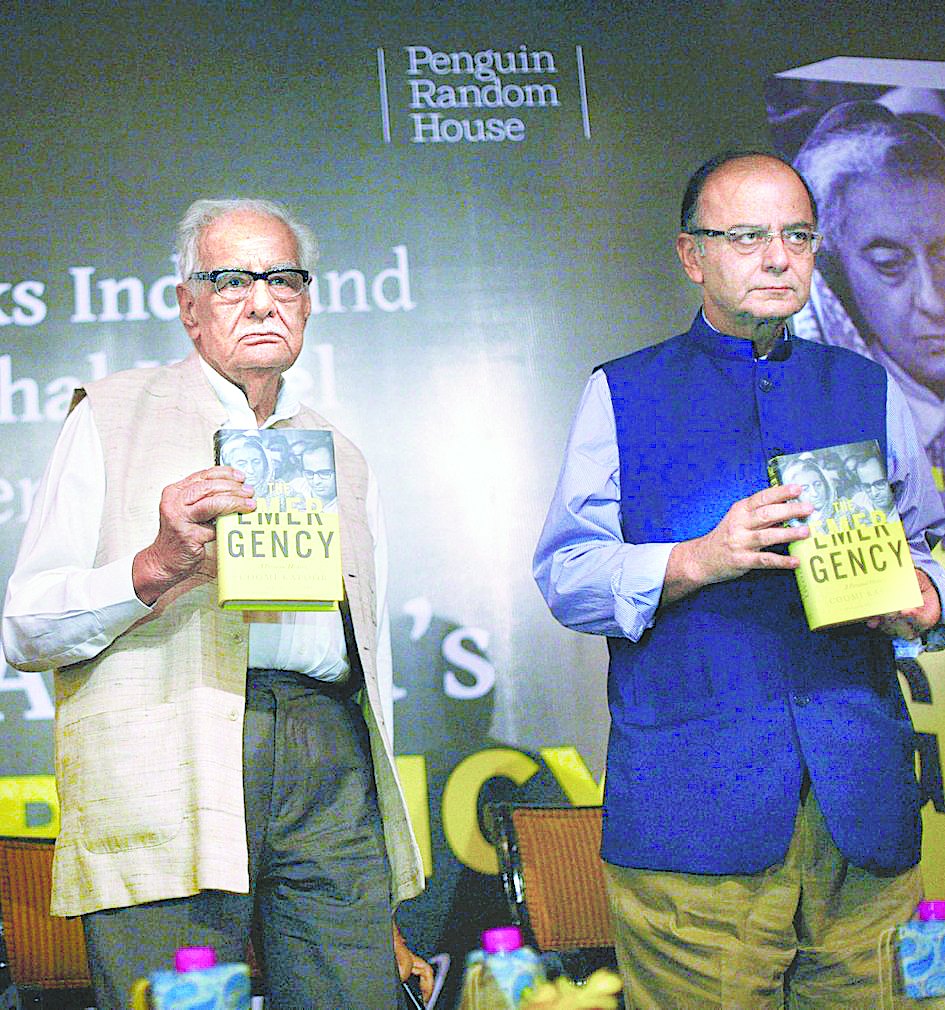
New Delhi, June 26: Playing raconteur of delectable tales must surely come as first nature to finance minister Arun Jaitley; playing at politics certainly second.
How he appeared to relish tearing away from the grimness of backdoor Lalitgate crisis management to resort in an evening of succulent storytelling.
An illiterate, down-to-ground newsagent unable to comprehend why he had been jailed under the Defence of India Act; a political periodical that had presaged the Emergency courtesy an astrologer's prediction; repealing her estranged husband Feroze Gandhi's press freedom legislation as Mrs Gandhi's first post-Emergency swipe.
And finally this one that brought the full house down - an anonymous couplet that only Jaitley could have kept salted away for 40 years.
Whetted by references to the role forced sterilisation had played in stoking public anger by lawyer Anil Dewan, Jaitley couldn't resist letting slip the cameo of the night, borderline risqué though it was. But in the Jaitley court, what's to prevent a good story getting told, especially if he is the teller?
Among the many smuggled scraps that reached them in the Emergency-era jails, he revealed, was this sardonic double thrust at the Indira-Sanjay dictatorship and those that didn't resist it enough - " Daad dete hain Mard-e-Hindustan ki; Sar kata sakte hain lekin nas kata sakte nahin (Praise be to the men and manhood of Hindustan; their heads they will have chopped, but their vas deferens they won't)."
The vas deferens is the duct that is sealed in male sterilisation.
The room rang with mirth like it was going out of fashion. Suddenly, any danger that an author's commemoration of 40 years of democracy's dark hour would turn dour dissipated in peals of laughter. Jaitley afforded himself a laugh his government is hard put to partake of at the moment.
The stage was the opening of The Emergency: A Personal History (PenguinViking) by journalist Coomi Kapoor, who reported the period as a young scribe at The Indian Express and who suffered her share of the consequences - husband Virender Kapoor, himself a columnist, was arrested and jailed for his resistance of Emergency-era censorship and repression.
The book is a racy and intimately told account of what transpired during the 19-month suspension of fundamental rights and freedoms by Indira Gandhi. Coomi said writing it 40 years later was still relevant chiefly because later generations of Indians ought to be aware of the consequences of democracy being bundled.
Journalist and The Telegraph columnist Swapan Dasgupta, who moderated the launch, attested eloquently by quoting a recent survey on poor Emergency awareness among Indians. "One person thought it was brought on by some global economic crisis...."
Kuldip Nayar, editor of The Indian Express at the time, called Coomi the "soul" of the resistance, such as that could be put up, on the news floor. But Nayar warned that four decades later, the dangers of authoritarianism and dictatorship had not vanished.
In a retort to Jaitley's assuring overture that the Emergency can't possibly return in this day and age, Nayar pointedly cautioned: "I don't say Emergency cannot happen again. Once again institutions are being diluted.... We must not let concentration of powers happen."
Jailed for three months during the period for refusing to fall in line, Nayar singled out his home tribe of journalists as having been the most spineless.
"I do not know what they were afraid of, but I could not drum up support to oppose and resist draconian measures," Nayar, now past 80, said shaking his head. "I have to say the media was most pathetic."
That fetched applause too, almost as robust as Jaitley's many tales. The minister appeared sanguine, though, there is no silencing the media any more.
"With the technology now available to people, with the explosion of social media tools and platforms, that (censorship) is impossible to achieve."
How well Jaitley would know that with the unstoppable cascade of Lalitgate revelations storming down on his government.

